National Reconstruction Front (Daxia)
National Reconstruction Front 我们这件事 | |
|---|---|
| General Secretary | Trang Shesh |
| Headquarters | Mirzak, Daxia |
| Newspaper | National Voice |
| Youth wing | Nationalist Wave Association |
| Membership (2027) | 20,143 |
| Ideology | Big tent Pragmatism Dirigisme Revolutionary Nationalism |
| Colors | Light Green, White |
| Assembly of the People | 13 / 500 |
| State Assembly (Daguo) | 7 / 40 |
| State Assembly (Xing) | 4 / 40 |
| State Assembly (Sanyu) | 2 / 40 |
| State Assembly (Pingu) | 8 / 40 |
| Party flag | |
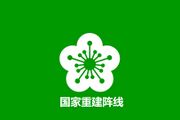 | |
The National Reconstruction Front is a centre-right big tent and founding political party of the Democratic Republic of Daxia. The NRF currently holds 13 out of 500 (2.6%) seats in the Assembly of the People and has legislative presence in four provinces but no governorships. Founded in 1951 by Qiu Heng by agglutinating several pro-government associations , war veterans's clubs and emerging labor organizations; the NRF maintained absolute and uninterrupted state power from 1951 to 1992 and presided over a dominant party system with no corresponding checks and balances to its authority. This system was maintained by a combination of corporatism, coercion and repression. Having being founded and led by army officers from its inception, the NRF was notably militarist, intervening in the Rusani Civil War on the side of the NCDP with the 'Little Incursion' in 1962 and helping the government of Canpei crush the democratic protests known as the Revolution of Dignity in 1984.
Established originally as a civi movement called the National Daxian Rally to support Dai Hanjian's 'Glorious Revolt' that toppled monarchical rule, it and later the rebranded NRF provided him and the military rulers after him with a wafer-thin veneer of democratic legitimacy that was renovated by elections that were never free nor fair and often without any candidates to oppose the NRF. Upon its 1992 defeat in national elections the party rapidly lost power and positions in the government bureaucracy, it was subjected to various corruption investigations (former president Tao Zexian was imprisoned for 3 years) and was eventually banned by the electoral board from 1993 to 1999. The party was greenlighted to participate in the elections of the year 2000 where it got around 2 percent of the votes cast and regained small representation in local assemblies. Ostensibly independent, the NRF has reinvented itself from being a party of power into what is now considered by political analysts to be an inconditional, submissive ally and political satellite organization of the Party of Daxian Democrats.
During its almost five decades in power the party went from favoring center-left, statist economic policies to preferring a more mixed model with some market oriented reforms that included privatization of certain state industries and abandoning import substitution programs. This ideological evolution however did not touch the economic interests of the Army which continued to have an outsized political and economic influence until the end of the regime. The NRF created many of Daxia's modern institutions such as the independent National Bank in charge of fiscal policy, a well funded public healthcare system and the bloated security organs. The current General Secretary of the party is Trang Shesh.
History
Foundation and Qiu Heng era

Qiu Heng's rise to the leadership of the country saw for the first time the ascendance of politics over purely military leadership; Qiu Heng saw the perpetuation of the military junta system as inherently unstable, absent an electoral mandate and the legitimacy it could bring, any ambitious general in charge of a military zone could feel themselves justified in attempting to take power the same way as the junta did in the first place. Since Qiu distrusted the established but outlawed old political parties and their cadres, he decided instead on building a new party from the ground up without 'any of the old chaff'. As the base of his new party of state he chose a pro-military civic association called the National Daxian Rally-NDR that had existed since 1945 but had never reached much relevance. The NDR had been started at the behest of military intelligence and was originally led by people close to it. Qiu directed the Ministry of Social Services and the Ministry of Finance to direct significant financial resources to the NDR to support its growth into a real national party that could hold on to power.
The junta leader himself joined the NDR in the spring of 1951 and was elected its General Secretary 'by acclamation' of the party delegates during the founding congress. This was followed by a massive surge in party membership as government employees joined en masse(to curry favor, preserve their jobs or genuine agreement with its programme and ideals), trade unions and government contractors enjoined their affiliates and employees to do the same. In this early stage the biggest labor union of the country, the then All-Daxian Workers Central Union negotiated generous terms on collective bargaining and perks for its members in exchange for its unrestricted support for the new political machinery. In accordance with the Basic Law passed earlier on the year, Qiu Heng announced the first national elections for President and a new National Assembly would take place concurrently in late 1951, he also announced his candidacy at the head of the now renamed National Reconstruction Front-NRF. Qiu Heng correctly deduced that the vast masses of the Daxian people were accustomed to strongman rule and yearned for stability, and so he presented himself to the public as the one leader who could be a guarantor of stability, social peace and economic growth without disruptions. Notwhitstanding that none of the other parties had ever held political power, they were decried as 'dangers to Daxia' that would collapse the country with their radicalism and hatred of traditional values. The NRF freely used government resources in the campaign, blatantly busing its supporters in military vehicles. The election was a comprehensive stomp where Qiu Heng and his party won 73% of the vote.
During this formative period the party embraced nationalism(it did not shy away from traditional Daxian chauvinism), center-left dirigist economic policies and supported the formation of social welfare programs. The latter two aspects helped it take the wind out of the sails of the CPD's support, who the NRF saw as its most dangerous opponent. Its dirigist and strong handed economic policies served well to steer the slowing Daxian economy back to growth and deal with the entrenched plutocratic interests that had become a holdover from the Qian system of patronage. Henceforth the economic powers would be subordinated to the political authority of the center and those that resisted this process would be pushed aside, their assets taken away and cannibalized by other actors. One aspect that is very criticized of Qiu Heng's economic handling is his decision not to decisively curtail the involvement of the military on economic activity. He allowed the army and figures linked to it to handle a number of lucrative companies, one such being the construction behemoth of the North Crona Production and Construction Corporation, much corruption was derived from these activities and would grow to become an issue that would cost the party much support.
Internally the party under Qiu Heng did not show many signs of institutional maturation, its internal party laws and processes were an afterthought, there were no regular party congresses or meetings to discuss policy or ideological subjects. Qiu Heng seemed to regard it as merely an electoral tool and he was not interested in it being anything more, he ran the government by himself with input from a closed clique. This attitude began to change during his third term of office when his health began to fail him, the issue of succession began to be a topic of special consideration and the party would be needed to make the an eventual transition a smooth one. The party finally got a working structure below the General Secretary, with a Politburo created and stacked with the president's loyalists from the bureaucracy and former military men; regional committees began to meet regularly and pick up the sentiments and opinions of the membership and transmit them to the center and the president began to meet with the Politburo on a monthly basis. The president's preferrence on possible successors is not recorded, his former minister of defense Yuga Khan wrote in his memoirs that the president mentioned wanting a civilian to succeed him during casual conversation but that no names were said. What was known was that he did not have a high opinion of his eventual successor, general Chi Long Qua, the few times he mentioned him was to deride him as 'General Pencil Pusher'; clearly he thought the man unworthy of following on his footsteps. Unexpectedly Chi Long Qua proved to be a capable operator of his own who by the time of the president's illness had begun putting many of his allies in positions inside the party's nomenklatura and was building bridges to the economic and military elites to convince them to join his presidential project. Qiu Heng's untimely illness and death prevented him from imposing his own candidate and Chi Long Qua was triumphantly successful in his takeover of the party only a few months later.
Chi Long Qua era and institutionalization

Chi Long Qua was elected as president in late 1964 after a campaign where his most prominent slogan was 'Continuity with a human touch', an empty phrase by the reckoning of most political scientists. The new president did not deviate much from his predecessors economic policies of growth based on import substitution but he did start dialing down the overwhelming presence of the state in the economy. He began the process of divesting the state from several sectors that had become unprofitable due to the corruption of state companies; he sold many of these state owned entities to government insiders and figures linked to the regime. This is the start of the phenomenon dubbed the 'musical chairs of wealth', the gist of it being that each new president disempowers and persecutes the economic elite that grew under their predecessor and grants their economic fiefs to figures closer to him; in effect creating a new economic elite that profits enormously during his term of office.
This act to assert presidential power became an important part of the NRF's internal political culture, almost a ritualistic form of imbuing the new president with supreme authority and at the same time freeing him from any ties and promises made by the former president; by reshaping the constellation of the stars around the center of power in his own image, the president underwent apotheosis and could never again be challenged. The labor section was also subject of reshufflings, with the forced retirement of Gong Zhen, the president of the All-Daxian Workers Central Union and a Qiu Heng crony who had been grumbling in private that the union's workers were due for a wide reaching renegotiation. When his comments were leaked to the president, he put in place an operation managed from the Ministry of Labor to give Zhen's internal rivals a shot in the arm; Gong Zhen was scandolously trounced in the internal election when he tried to reelect himself. Chi Long Qua moved quickly to subdue and bring in line all of the pillars of support that underpinned Qiu Heng's power, a playbook that all NRF presidents after him would follow to the letter.
Chi Long Qua's reelection to a second term saw a minor hiccup when despite all of the NRF's trickery and electoral thuggery it saw its support slip by five percentage points, a drop in support that might be explained by a particularly silver tongued Liberal party candidate who positioned himself to the right of the NRF and attacked it for its 'socialist' positions, siphoning some middle class votes with his tactic. In any event he was crushed at the polls and later disappeared without a trace but the party took it as a warning; they were not differentiated enough in their economic policies from their much maligned foes and the public could tell. Chi Long Qua's second term saw a number of new flagship policies come to the forefront, one of the most important was his 'March Inland' campaign to direct growth away from the saturated and overpopulated coastal regions towards the interior; he distributed a limited amount of state lands to the urban poor to encourage them to settle in rural localities. The program was mildly successful, an estimated 30 million people moved out of the coastal cities by 1972 and the land distribution scheme continued under various names until the fall of the NRF.
Foreign policy-wise Chi Long Qua favored a muscular foreign policy and was not very open to compromise on Daxian objectives. He lent significant political and material support to Canpei's government of national emergency on the stated condition that it follow Daxian leadership of the region. When a top Canpei official suggested an arrangement dependent on 'shared values' Chi Long Qua threatened an invasion; in the president's eyes the deal was simple: you receive our generosity and do as we say, there is no wiggle room. Relations with Rusana continued in the same track as before, Qua exerted a heavy handed pressure on its internal affairs with the connivance of minority groups and bribed tribal chiefs and supported by his military presence. He continually pushed for more rights to be enshrined for ethnic Daxians and for the implementation of a quota system for political representation and cabinet positions. The implementation of his proposed quota system was one of the last achievements in the realm of foreign policy. He also put forward the notion of an Audonian cooperation organization, a vehicle of economic colonialism in his conception; the Audonia Community of Economic Cooperation would be the end product of this kernel.
The succession of Qua was a more ordered and smooth affair than his own climb to power, it was him that set down the exact process for his successors to follow. Beginning in 1971 he gave his cabinet ministers the operational freedom to start building networks and quietly canvassing internally; that this was all against the electoral laws of the time was immaterial. That the president already had a favorite was only rumored, all the prospects seemingly thought they had a chance to be the ones invested by the presidential finger. On March 1972 at a plenary meeting of the NRF, Bao Freng the president of the All-Daxian Workers Central Union announced to the plenum that all the sectors of the party had agreed that Min Bib Doda, then Minister of Finance, would be the party's presidential candidate for the 1972 presidential election. Bao Freng's announcement of the candidate would be replicated verbatim in all presidential candidate announcements from then on, another ritual of the NRF wherein the so called sectors of the party had discussed and come to unanimous agreement; there was no such agreement only the president's word and the absolute obedience of the party to it. Doda was a dour economist who owed his career completely to Qua, a man of the system through and through who could be relied on to not rock the boat and carefully curate Chi Long Qua's legacy.
Min Bib Doda era and civilianization of the system
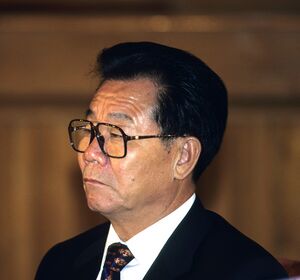
Min Bib Doda was never a man of the people; variously described as a bespectacled bookworm, a cardboard cutout, a grandfather dazed by the sun and an unimaginative toadie. Over time he proved to be all these things but also demonstrated an almost machine like perseverance in achieving his goals, despite his obvious shortcomings as a candidate. The support of Chi Long Qua meant reaching the presidency was a foregone conclusion but the numbers and the margins of such a victory were almost as important, an important dip in the number of NRF voters would gravely undermine the party's monolithic and rock solid grip on power; such was the wisdom at the time. Doda began a vigorous ground campaign such as had not been seen since Qiu Heng's original presidential campaign, and the derided bookkeeper proved oddly charismatic and charming, unafraid to press the flesh with peasants and factory workers and carrying his own luggage. People nicknamed him 'Grandfather Toad' due to his comically large black rimmed glasses and toothy crooked smile. In his ordinary plainness he became relatable to the common people, and also someone they could trust with running the country thanks to the constant trumpeting of his financial expertise by the propaganda machine. Grandfather Toad sailed to victory with a whooping 93% of the vote, only behind Chi Long Qua's first term win by one percentual point.
As the first truly civilian president from the NRF, Doda was dissatisfied with the state of affairs regarding the military's involvement in the economic realm. He began to empower the civilian run security agencies to the detriment of military intelligence and used a strategy of divide and conquer, pitting military commanders against each other. He also liberally reshuffled many high ranking officers from Qua's time into the retirement pool and began deconstructing the financial scaffolding the military owned conglomerates had created. As most officers were also party members by this time, the double pressure of military and party discipline kicked in and most in the army fell in line; those who did not were isolated and quietly shifted to irrelevant positions or were fired. Under Doda the business empire of the army was almost entirely liquidated and put in the hands of private investors, Doda was adamant the state should only have a stake in critical and highly strategic sectors of the economy such as energy production, which became a state monopoly. Doda wanted a much more narrow and focused approach to maximize the effectiveness of public funds in stumulating economic efficiency, leaving behind the waste of public monies on the production of shoes, butter, parasols and other consumer goods by the state was seen as the first step in reducing wastage.
Doda's reign also saw the marginalization of the military men from political positions and their replacement with lawyers and technocrats. The rebellious general Pantu Gou once bitterly complained about the perceived ingratitude of the system against generals like him thus: the present was bought with the blood of the army and its sons and now the future has been handed down to chiselers in suits and self interested frauds. On August 1974 the commander of the sixth military zone comprising Peguo and Xing provinces mutinied. General Pantu Gou occupied the provincial capitals of Touxian and Xidian, he communicated his demands by phone: an end to the marginalization of the army from decisionmaking, an end to the firing of officers critical of government policies, restoration of ranks and pensions of those fired. The government rejected any negotiation with 'mutinous vestiges of a privileged elite' and moved military elements to suppress him. Pantu Gou failed to convince other military leaders of importance to join the mutiny and his own troops began to desert in dismay. A mere four days after the start of the mutiny the general was arrested in Touxian and his forces sent back to their barracks. Pantu Gou's shortlived mutiny was the last and most public display of discontent from within the ranks of the army, after this event the generals seemed to resign themselves to a curtailed role as protectors of the system but not powerbrokers again. Min Bib Doda used the incident as an excuse to also put in place a ban on military officers in active duty to serve as governors of provinces or mayor as had been the case since Qiu Heng's reign; members of the party who wished to aspire to such postings had to first renounce their military commissions and be properly vetted for signs of 'militarized thinking deviances' and inadequate fidelity to the system. Doda is today lauded as being the president who defanged the military and bent it to the will of civilian politicians again; this tradition of the military staying out of politics has continued and taken root even after a change of party at the top.
Doda also began a national campaign against bribery and corruption; dubbed the 'Rat-catching crusade'. Doda's crusade had two main objectives, firstly to shore up public support for the party by cleaning out the most egregious cases of corruption and secondly to recover and in some cases repatriate ill gotten wealth and use it for public works. Billions of lire were squirreled away in bank accounts across the world by corrupt officials and tax authorities typically looked the other way to avoid embarrassing political questions. Doda installed an official who was all but a viceroy in name at the top of the tax collection agency, his sole remit being to plunge into these shady financial networks and bring the stolen resources back. There was grumbling and resistance from within the system to the campaign; in response the powers of the National Intelligence Bureau were dramatically beefed up to accelerate the campaign and silence dissenters. In the first term of Doda's term some 1.5 million functionaries of all levels were prosecuted and in his second term another 2.4 million were procesed by the justice system. An estimated 12.6 billion lire were recovered by tax authorities during the eight years the campaign was active. The effectiveness of the campaign also brought its principal executor to public attention, Chief Inspector of the National Tax Directorate Yang Qiu. A veteran and effective government official, the tight lipped Qiu was cut from the same bureaucratic cloth as the president and was soon placed as the forerunner to be te NRF's candidate despite all his protestations that he planned to retire at the end of Doda's presidency. With Doda's support and despite his earlier claims of wanting to retire, Qiu was anointed as the oldest presidential candidate ever fielded by the party at 71 years old.
Yang Qiu era and the Slow Death
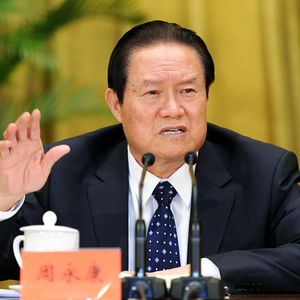
Yang Qiu's candidacy seemed to be a bit of a blunder, neither charismatic or a rousing orator the campaign struggled to excite. The NRF's saving grace was that the opposition fielded equally boring and bland candidates, and there were six of them which utterly pulverized any hopes of a unified anti government vote. The ruling party's tactic experienced a shift from trying to gather more votes to depressing voting, the NRF could always mobilize its stalwarts and count on its captive base to secure a win and undecideds would stay at home if they saw zero chance of any opposition candidate having a chance. The system worked overtime to produce dozens of daily polls and rainbow colored charts showing the impressive array of presidential candidates and their small individual percentages compared to Yang Qiu. The tactic of painting Yan Qiu's win as a foregone conclusion worked as vaticinated as the NRF core voters dutifully went to the polls as usual and millions of undecided voters decided to stay in their homes, the final turnout was around 48%. The result was a mixed bag as Yang Qiu won the election but the percentage of the vote he got was the lowest the party had gotten in a presidential election since 1951; and since the electoral authorities were suspected of fudging the numbers it is very likely the real NRF vote was much, much lower, perhaps as low as forty-five percent.
This unauspicious beginning to Yang Qiu's first term was only the first sign of the times to come for the party. Pressured by party stalwarts on the Politburo, Yang Qiu began to dial back on the 'montage of democracy', as the presence of opposition parties in the electoral system was called in internal discussions and documents. As the CPD had been banned back in the presidency of Qiu Heng, the government went after the moderate socialists of the All-Daxia Socialist Party and the moribund Liberal Party. In typical fashion for a man whose career was spent in the tax offices, Qiu ordered a series of stringent audits of the finances of opposition parties, freezing their bank accounts while the audits were conducted. The audits lasted well over two years and by then the opposition parties had been starved of all financial resources and many of its cadres were arrested on bogus charges of tax fraud. Still Yang Qiu did not yet take the ultimate step of banning them, resisting calls to officialy turn the country into a one party state for fear of his public standing crashing and of people openly protesting on the streets of the capital.
On March 1982 the president's standing with the population did take a big hit after a massive 7.9 magnitude earthquake devastated the city of Kaiping, killing some seventy thousand people and injuring another eighty thousand. Emergency services in Kaiping collapsed under the strain of so many casualties and help from the central government was sluggish at best. Yang Qiu's words on national television that: 'Everything is under control, there are shortages of aid anywhere, we will efficiently take care of this small quake'. The president's words seemingly minimizing the scale of the tragedy and the gripping images coming from Kaiping of corpses buried under the rubble coupled with the shocking ineffectiveness of the government's response(Yang Qiu cycled through three different ministers of national emergencies during the crisis) was a big blow to the people's trust in the party. Althought Qiu tried to walk back his comments and declared a day of national mourning, the damage was done. Victim's associations would in time morph into groups campaigning for political change at the top, one of these was formed by a political unknown named Linge Chen who would unseat the party only ten years later. The 1982 Kaiping earthquake was thus a watershed moment in Daxian history, from then on the NRF would have to resort to outright electoral fraud and heavy handed repression to maintain its grip on power, and even this would prove to be not enough by the early 90's. The era of NRF rule after the earthquake is named by historians as the Slow Death, a period of inertia and decay as the economy slowed down dramatically and social unrest at the party's misrule grew exponentially.

During Min Bib Doda's last year in office his government had borrowed excessively from overseas lending institutions to finance big ticket projects and speed their completion in a rare display of short term thinking and fiscal irresponsibility by Doda; he desperately wanted to give his chosen successor a boost in the polls. To start paying off the principal and accumulated interests of these onerous loans, Yang Qiu was now forced to implement measures of austerity or 'Republican Austerity' as he liked to call it. He ordered massive cutbacks in provision of health and social services, slashed education and school budgets, froze salary raises across the board (not even to keep up with inflation). All major infrastructure projects were put on hold and he even started to cut down pensions, an incredibly costly political move as the elderly were assiduous NRF voters. By turning the debts incurred by Doda on his behalf into something every Daxian had to suffer for, Qiu destroyed any goodwill he had left with the public. People on the street started calling him the 'Old Satrap' and people said that if he slept through cabinet meetings the country was being led by an old man asleep at the wheel. There were serious doubts about the wisdom of Qiu running for a second term due to his clear and rising unpopularity. Yang Qiu silenced these 'tapeworms in the party's belly' with the intelligence services which remained fully loyal, although some of the 'tapeworms', many important of them political operators, began to quietly distance themselves. The president was duly confirmed as the NRF presidential candidate for 1984 during a televised party conference, widely mocked for the grave demeanour of the party heads sitting next to the president, the worry evident in their expressions.
Yang Qiu invariably won the election of 1984 but dropped fourteen percentage points from his first victory, down to sixty nine percent of the vote. Going by the rule that the party fraudulently doubled the number of votes received, it can be said with confidence that Qiu won no more than thirty six percent in truth. Strangely for Daxian presidential elections to that date, the president was dogged throught the campaign by the candidate of a small, recently formed political formation named the Party of Daxian Democrats. Its candidate was a total unknown, some accountant who looked as if he had been plucked from a catalogue of bureaucrats, but this Linge Chen was a strident and irascible orator who shamelessly mocked his elderly rival. At one point in the campaign Linge Chen sought out the president at a campaign stop in Minxia City and confronted him about the continued spilling of industrial waste on Lake Zhenzhu, at one point pointing at Qiu with his finger and poking him in the chest. The president tried to play the elder statesman but looked clearly annoyed and rattled before the cameras. Linge Chen would later be arrested and charged with disrespecting the president and be prevented from continuing to campaign by a court order but nonetheless he made an impact; his small party would get almost twenty percent of the vote. In his book 'The Wave', Linge Chen revealed that important members of the NRF both from the Politburo and regional party leaderships met with him in secret and offered their resources to his project. Chen further claims that it was his ideas that attracted them but the truth may be less flattering, scared and sidelined members of the nomenklatura hedging their bets against a Yang Qiu loss. It is this quiet transfer of cadres from one party to another that may have been the deciding factor in the shocking surprise victory of Linge Chen and the PDD in 1986, snatching the capital from the government. The defeat in the largest city of the country was a great humiliation to the party and to the president personally. Many NRF insiders attribute the defeat to treason by important cadres who either switched sides and funneled NRF votes to Linge Chen's party or simply enacted a campaign of 'limp wrists', that is they basically surrendered the election without a fight. Both options are viable as the NRF local structure in the city was deepy aggrieved by the imposition of a candidate who was not well known in Mirzak and who had been put forth over the heads of more competitive options. The PDD may also have offered to overlook and paper over cases of corruption by the NRF administrations of the city if they got to power. Yang Qiu responded to the rumors of backstabbing by having the party initiate proceedings to first sanction and then expel several important party bosses of the capital. This restored party discipline on the surface but Qiu's leadership had already been near fatally damaged by the ordeal and it would only continue to weaken in the last two years of his presidency. The final stretch of his second term were spent trying to reactivate an economy saddled with large debts and a worrying trend of capital flight due to the high costs imposed on businesses by government corruption and the growing insecurity in many regions due to a renewed insurgency by the emboldened CPD. The CPD once more began a campaign of attacking state security forces and kidnapping wealthy individuals to fund its activities, activities that the National Intelligence Bureau increasingly failed to stop thus losing the government the support of the economic elites.
The disaster of the economy and the electorial fiasco of the capital turned Yang Qiu into a paper tiger inside the party. At a meeting of the Politburo where he tried to put forward the name of one of his trusted henchmen as the next presidential candidate for 1988, he was criticized for selfishness and disregarding the wellbeing of the party. Most of the Politburo instead aligned behind the growing reformist wing of the party and its dark horse candidate, Tao Zexian, who was seen as the one hope of convincing the public to maintain the NRF in power (with minimal vote rigging). Tao Zexian was an economist by trade and his time in government had been in the intelligence agencies, he was seen as a young rising profile, sleeker and oriented to modernity. Having no hope of quelling the revolt without destroying the party, Yang Qiu stepped back and accepted Tao Zexian would be the candidate. The president spent the last months of his term out of the public eye, trying to devise ways to repair his public image to no avail.
Tao Zexian era and collapse
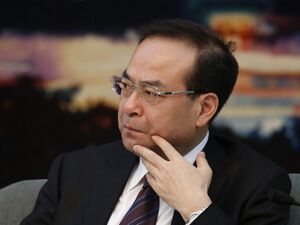
The campaign of 1988 was the most hotly contested in Daxian history. Linge Chen took leave from running the capital to compete once more for the highest office, his experience of running the largest city of the country giving him the credentials to do so. In contrast the younger Tao Zexian was seen by many as a neophyte controlled by the same old men from the NRF. Linge Chen mercilessly attacked him as a johnny come lately, a greenhorn and an empty suit with an emptier head. The NRF tried to paint Chen as a dangerous rabble rouser and demagogue, interested only in wrecking the system rather than making it work. The campaign was intense and the polls were not favorable to Tao Zexian, most showed him trailing Chen by at least five percentage points. Formed confidantes have admitted in interviews that while at first the NRF candidate refused to resort to 'electoral trickery', as the date of the election came closer and his numbers continued to sag against his opponents he changed tack; only post electoral engineering could secure him the win.
In what has been acknowledged as open fraud by most historians and analysts, the NRF won the 1988 election with 52% to the PDD's 48%; the tightest margin it had ever faced in its history. Immediately after the results were announced on live television, Chen called for massive demonstrations 'against the blatant electoral theft of the presidency' and declared himself the legitimate president. Crowds of Chen supporters marched on the electoral commission, the NRF headquarters and the presidential palace. With the regime under pressure on the streets Yang Qiu wanted to send in the tanks(there are rumors that he gave the order but it was refused), but Tao Zexian chose to instead play for time by pressuring the electoral commission to admit the myriad complaints about the process, but to slow roll their resolution. He did not want to start his presidency under the dark cloud of repression and preferred instead to try to come to an arrangement with the wily Chen. The details are derived only from word of mouth of a few politicians reportedly present, Zexian and Chen met on February 8th in the house of a local judge who knew both men. As told by Tao Zexian's former chief of staff in a book written while in exile, the deal offered by the elect president to his rival was that Chen would call off the demonstrations and promise not to prosecute Tao personally after he left office, in exchange Tao would only serve a single term as president. Chen countered that he would agree but that if Tao tried to renege on the one term condition at a later time then Chen would release tapes in his possession that had unspecified compromising conversations of Tao and other NRF leaders.
Persecution of remnants
Rehabilitation
Ideology
List of General Secretaries
| No. | General Secretary | Portrait | Took office | Left office |
|---|---|---|---|---|
| 1 | Qiu Heng (1902-1964) | 
|
1951 | 1964 |
| 2 | Chi Long Qua (1905-1972) | 
|
1964 | 1972 |
| 3 | Min Bib Doda (1913-1985) | 
|
1972 | 1980 |
| 4 | Yang Qiu (1922-1999) | 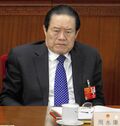
|
1980 | 1988 |
| 5 | Tao Zexian (Born 1945) | 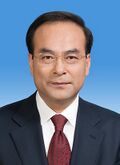
|
1988 | 1992 |
Electoral History
Presidential elections(1951-1988)
| Election | Party candidate | Popular vote | % | Result |
|---|---|---|---|---|
| President elected by popular vote | ||||
| 1951 | Qiu Heng | 210,653,846 | 73% | Elected |
| 1956 | 262,595,890 | 91% | Elected | |
| 1960 | 274,138,566 | 95% | Elected | |
| 1964 | Chi Long Qua | 271,252,897 | 94% | Elected |
| 1968 | 252,366,896 | 89% | Elected | |
| 1972 | Min Bib Doda | 335,483,645 | 93% | Elected |
| 1976 | 358,654,823 | 97% | Elected | |
| 1980 | Yang Qiu | 295,365,655 | 83% | Elected |
| 1984 | 225,651,211 | 69% | Elected | |
| 1988 | Tao Zexian | 278,356,983 | 52% | Elected |